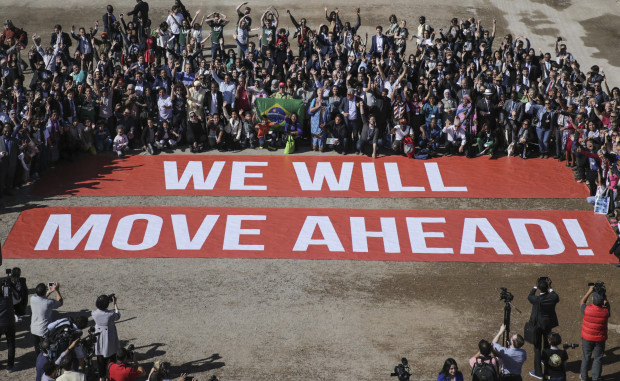Lawmakers urge Wolf to join interstate effort to meet Paris climate goals
-
Jon Hurdle

David Keyton / AP Photo
Participants at the COP22 climate conference stage a public show of support for climate negotiations and the Paris agreement in Marrakech, Morocco, Friday, Nov. 18, 2016. Some Pennsylvania state lawmakers are urging Gov. Wolf to join other states committed to the goals of the U.N. climate agreement, which President Trump has rejected.
State lawmakers advocating statewide action on climate change will on Monday urge Pennsylvania Gov. Tom Wolf to join the U.S. Climate Alliance, a new group of 13 states that seeks to comply with the goals of the Paris Climate Agreement despite the withdrawal by the Trump administration.
Supporters of continued efforts to cut carbon emissions will launch House Resolution 421, calling on Pennsylvania to join the other states in an effort to stay on track with the Paris goals, defying the rejection of that initiative by President Donald Trump.
By Sunday afternoon, the resolution had 36 cosponsors, all but one of them Democrats, indicating that the measure has little chance of being adopted in the 203-member House of Representatives that is dominated by Republicans.
The resolution says that climate change is a threat to the environment, public health, and the economy, and that it would be in Pennsylvania’s best interests to join the interstate effort to cut the carbon emissions that underlie global warming.
Even if the House approves the measure, it is not clear whether it will be supported by Gov. Tom Wolf, whose endorsement would be needed to join the Climate Alliance.
Wolf’s spokesman, J.J. Abbott, said the Democratic governor sees Trump’s decision to leave the Paris accord as “flawed and short-sighted,” and wants to pursue clean-energy policies that raise economic growth. But Abbott declined to say whether the governor will pursue those goals by joining the Climate Alliance.
“Governor Wolf understands that Pennsylvania is uniquely positioned for economic growth from the free-market shift to cleaner energy and reducing emissions through public and private innovation, technological advancements, and stronger environmental protections,” Abbott said in a statement.
He said the governor would seek to advance his energy goals through an “internal working group” that will look at how the state can increase growth using measures such as energy efficiency, natural gas and renewables.
Abbott would not say who would sit on the working group or whether it had the same goals as the Climate Alliance, but he said it might work with other states.
“The goal of this collaborative effort is to identify existing resources available to address climate change and grow these sectors,” he said.
Rep. Leanne Krueger-Braneky, a Delaware County Democrat who authored the resolution, said that as a “pragmatist,” she did not expect “unanimous” approval in the House but argued that Pennsylvania could play a role in combating climate change if it joined the interstate effort.
“In the absence of leadership at the federal level, it’s up to states and local governments to lead,” Krueger-Braneky said.
She said Wolf and his staff have said they want to cut emissions but have not committed so far to joining the interstate effort.
“I have talked to both him and his staff who have said they are very committed to reducing CO2 emissions,” she said. “They are still considering whether they will sign on to the Climate Alliance or not.”
Krueger-Braneky said it was not clear whether the resolution would be referred to the House Environment and Energy Committee before being discussed on the House floor.
Steve Miskin, a spokesman for the Pennsylvania House Republicans, said Pennsylvania has already cut greenhouse gas emissions as a result of market forces, a reference to the switch from coal to natural gas by power generators.
“These reductions are the result of market forces and not the heavy hand of government regulation or unenforceable international pacts,” Miskin said.
The Climate Alliance was launched by Democratic governors Jerry Brown of California, Jay Inslee of Washington, and Andrew Cuomo of New York, on June 1, the day that President Trump announced the U.S. withdrawal from the 195-nation Paris Agreement. The states’ initiative aims to reduce carbon emissions by 26-28 percent from 2005 levels and to comply with the Clean Power Plan, an Obama-era measure to cut power-plant emissions, that has been frozen by the courts and shelved by the Trump administration.
















